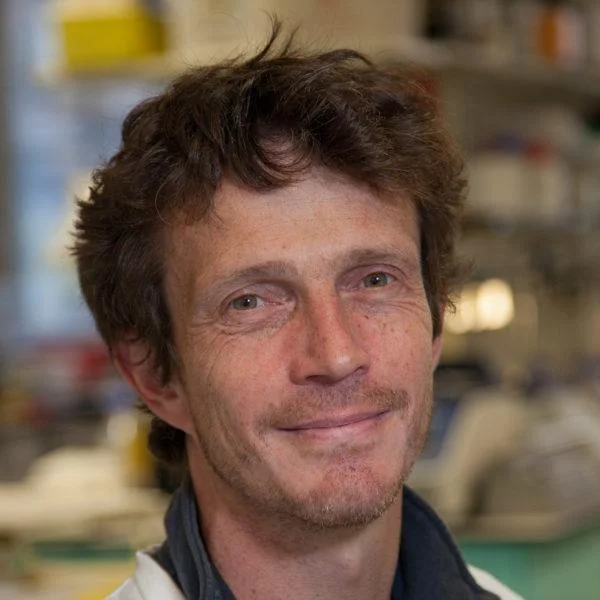
Dr Angus James Cameron
PhD
Reader in Cell Signalling and Tumour Biology; Director of Graduate Studies (BCI)
Group Leader
Research Focus
Protein kinases represent the largest group of drug targets in cancer therapy. My research focuses on kinases regulating cancer cell growth and motility to understand how and when to target them with drugs.
Key Publications
Disruption of pancreatic stellate cell myofibroblast phenotype promotes pancreatic tumor invasion. Cell Reports (2022) 38(4):110227. PMID: 35081338
Inhibitor-induced HER2-HER3 heterodimerisation promotes proliferation through a novel dimer interface. Elife (2018) 7. pii: e32271. PMID: 29712619
Knockout of the PKN family of Rho effector kinases reveals a non-redundant role for PKN2 in developmental mesoderm expansion. Cell Reports (2016) 14(3):440-448. PMID: 26774483
mTORC2 targets AGC kinases through Sin1-dependent recruitment. Biochem J (2011) 439(2):287-97. PMID: 21806543
PKC maturation is promoted by nucleotide pocket occupation independently of intrinsic kinase activity. Nat Struct Mol Biol (2009) 16(6):624-30. PMID: 19465915
Major Funding
- 2023-2026- MRC Project Grant: £774,000
- 2022-2025- Willoughby Trust Clinical Studentship: £250,000
- 2022-2026- Barts Charity Project Grant, £179,000
- 2021-present- Queen Mary Innovation Impact Fund, £100,000
Other Activities
- Associate Editor of The Journal of Pathology
- Member of the Biochem Journal Editorial Panel
- Advisory Board Member - European Pharma Summit- Design & Screening conference 2017
Research
The targeting of protein kinases represents an opportunity and challenge in cancer treatment. Some 2% of transcribed genes are kinases, many implicated in tumorigenesis and all potentially druggable.
My research encompasses various cancer associated kinases, including PKC, PKN, mTOR and EGFR family tyrosine kinases. In particular, my work on PKC and the HER family of tyrosine kinase growth factor receptors has revealed that inhibitors can have surprising allosteric effects on kinase function with significant implications for therapy.
My group is currently examining the role of the PKN kinases in malignant progression. PKN kinases are effectors of Rho family GTPases, regulating cell shape, adhesion and motility. Our studies on the role for PKN family members in mammalian development has provided significant insight; we have described a key non-redundant role for the PKN2 isoform in the regulation of embryo morphogenesis, cell proliferation and migration; phenotypes critically linked to cancer progression (Cell Reports 2016).
The PKN kinases are dramatically upregulated in many cancers and high expression has been correlated with metastatic disease – the spread of cancer around the body. Our current studies focus on the stromal roles for the PKN kinases in pancreatic and breast cancer, supported by the novel roles we have discovered for PKN during development.
The ultimate goal of this research is to assess whether these kinases represent a significant cancer drug target.
Other Activities
- Associate Editor of The Journal of Pathology
- Member of the Biochem Journal Editorial Panel
- Advisory Board Member - European Pharma Summit- Design & Screening conference 2017
- Athena Swan Committee member - Silver Award 2015/2018
- Barts Pancreas Tissue Bank (BPTB) committee member: 2017-present
Major Funding
- 2023-2026- MRC Project Grant: £774,000
- 2022-2025- Willoughby Trust Clinical Studentship: £250,000
- 2022-2026- Barts Charity Project Grant, £179,000
- 2021-present- Queen Mary Innovation Impact Fund, £100,000
- 2021-2022- Barts Charity Seed Award, £49,750
- 2018-2021- Worldwide Cancer Research/PCRF Research Grant, Targeting PKN to suppress stromal activation in pancreatic ductal adenocarcinoma,'£235,633
- 2016-2018- Academy of Medical Sciences/Wellcome Trust Springboard Award, Defining the role of PKN2 in cancer-associated fibroblasts, £99,773
Recent Publications
TGFβ-mediated MMP13 secretion drives myoepithelial cell dependent breast cancer progression Gibson SV, Tomas Bort E, Rodríguez-Fernández L et al. npj Breast Cancer (2023) 9(7)
The Future of Precision Oncology Rulten SL, Grose RP, Gatz SA et al. International Journal of Molecular Sciences (2023) 24(7)
Investigating the Role of Protein Kinase N2 (PKN2) in Pancreatic Ductal Adenocarcinoma Okail MH, Kocher H, Cameron A Pancreatology (2023) 23(10) e10
Opposing roles for ADAMTS2 and ADAMTS14 in myofibroblast differentiation and function Carter EP, Yoneten KK, Gavara N et al. Journal of Pathology (2023) (7)
Cancer-associated fibroblasts in pancreatic cancer: new subtypes, new markers, new targets Menezes S, Okail MH, Jalil SMA et al. Journal of Pathology (2022) 257(7) 526-544
PKN2 deficiency leads both to prenatal ‘congenital’ cardiomyopathy and defective angiotensin II stress responses Marshall JJT, Cull JJ, Alharbi HO et al. Biochemical Journal (2022) 479(7) 1467-1486
Disruption of pancreatic stellate cell myofibroblast phenotype promotes pancreatic tumor invasion Murray ER, Menezes S, Henry JC et al. Cell Reports (2022) 38(7)
Targeting the HER3 pseudokinase domain with small molecule inhibitors Colomba A, Claus J, Gao F et al. (2022) 667(7) 455-505
Membrane Tension Orchestrates Rear Retraction in Matrix-Directed Cell Migration Hetmanski JHR, de Belly H, Busnelli I et al. Developmental Cell (2019) 51(1) 460-475.e10
Membrane tension orchestrates rear retraction in matrix directed cell migration Hetmanski JHR, de Belly H, Nair RV et al. INTERNATIONAL JOURNAL OF EXPERIMENTAL PATHOLOGY (2019) 100(11) A44-A45
https://www.webofscience.com/api/gateway?GWVersion=2&SrcApp=PARTNER_APP&SrcAuth=LinksAMR&KeyUT=WOS:000498417900087&DestLinkType=FullRecord&DestApp=ALL_WOS&UsrCustomerID=612ae0d773dcbdba3046f6df545e9f6a
Team
Postdoctoral Researchers
- Dr Shinelle G. Menezes
- Dr Lorena Alba-Catellon
PhD Students
- Ms Priththivika Baskaran
- Ms Elizabeth Murray
- Ms Josie Williams
Biography
I completed my BSc in biochemistry at the University of Bath where I got hooked on research while working on a placement year in the US on protein phosphatases and virology.
I studied for my PhD in Glasgow on a Wellcome Trust Prize studentship working on receptor mediated signal transduction, graduating in 2000. After completing a 2 years Wellcome Trust postdoctoral fellowship in Glasgow, I joined Professor Peter Parker’s lab at the Cancer Research UK London Research Institute where I studied the role PKC family protein kinases in development and cancer.
I joined Barts Cancer Institute in 2013 as an Early Career Researcher in the Centre for Tumour Biology and was promoted to Senior Lecturer in 2018.
